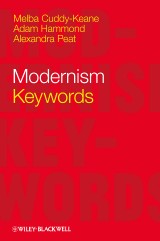Details

Modernism
KeywordsKeywords in Literature and Culture (KILC). 1. Aufl.
|
68,99 € |
|
| Verlag: | Wiley-Blackwell |
| Format: | EPUB |
| Veröffentl.: | 05.02.2014 |
| ISBN/EAN: | 9781118325971 |
| Sprache: | englisch |
| Anzahl Seiten: | 288 |
DRM-geschütztes eBook, Sie benötigen z.B. Adobe Digital Editions und eine Adobe ID zum Lesen.
Beschreibungen
<p>Guided by the historical semantics developed in Raymond Williams' pioneering study of cultural vocabulary, <i>Modernism: Keywords</i> presents a series of short entries on words used with frequency and urgency in “written modernism,” tracking cultural and literary debates and transformative moments of change. <br /><br /><b>Short-listed for The Modernist Studies Association 2015 Book Prize for an Edition, Anthology, or Essay Collection</b></p> <ul> <li>Highlights and exposes the salient controversies and changing cultural thought at the heart of modernism</li> <li>Goes beyond constructions of “plural modernisms” to reveal all modernist writing as overlapping and interactive in a simultaneous and interlocking mix</li> <li>Draws from a vast compilation of more than a thousand sources, ranging from vernacular prose to experimental literary forms</li> <li>Spans the “long” modernist period, from its incipient beginnings c.1880 to its post-WWII aftermath</li> <li>Approaches English written modernism in its own terms, tempering explanations of modernism often derived from European poets and painters</li> <li>Models research techniques based on digital databases and collaborative work in the humanities</li> </ul>
<p>Credits and Acknowledgments viii</p> <p>Introduction: Unsettling Modernism x</p> <p>Note on References xviii</p> <p><b>A</b></p> <p>Advertising 1</p> <p>Atom, Atomic 6</p> <p>Avant-Garde 11</p> <p><b>B</b></p> <p>Best Seller 15</p> <p>Bigness, Smallness 20</p> <p>Biography, New Biography 26</p> <p><b>C</b></p> <p>Common Man 34</p> <p>Common Mind, Group Thinking 40</p> <p>Conventional, Conventionality 45</p> <p>Coterie, Bloomsbury 49</p> <p><b>D</b></p> <p>Democracy 56</p> <p>Difficulty, Obscurity 63</p> <p><b>E</b></p> <p>Einstein 70</p> <p>Empire, Imperialism 77</p> <p><b>F</b></p> <p>Fascism 85</p> <p>Form, Formalism 91</p> <p><b>G</b></p> <p>God, Gods 99</p> <p><b>H</b></p> <p>Hamlet 107</p> <p>Highbrow, Middlebrow, Lowbrow 111</p> <p>Hygiene 119</p> <p><b>I</b></p> <p>Impression, Impressionism 125</p> <p>International, Internationalism 129</p> <p><b>M</b></p> <p>Manifesto 136</p> <p>Modern, Modernism 139</p> <p><b>N</b></p> <p>Negro, New Negro 147</p> <p><b>P</b></p> <p>Personality, Impersonality 155</p> <p>Primitive 162</p> <p>Propaganda 170</p> <p><b>Q</b></p> <p>Queer, Gay 177</p> <p><b>R</b></p> <p>Race 184</p> <p>Readers, Reading 191</p> <p>Reality, Realism 196</p> <p>Rhythm 203</p> <p><b>S</b></p> <p>Sentimental, Sentimentality 210</p> <p>Shock, Shell Shock 214</p> <p><b>U</b></p> <p>Unconscious 223</p> <p>Universal 231</p> <p><b>W</b></p> <p>Woman, New Woman 238</p> <p>Words, Language 246</p> <p>Index of Modernist Authors 254</p> <p>Index of Modernist Keywords 263</p>
<p>"Everyone teaching literary modernism should spend time with this book."<br />—<b>James Gifford, <i>University of Toronto Quarterly</i></b></p> <p>"Their resources build from primary texts and through the ready resources in the Modernist Journals Project, JSTOR, the Times Literary Supplement Historical Archive, and so forth. The great merit of this approach is its adept management of primary and secondary materials, moving between the terms used in the modernist period, conceived here loosely as from 1880 to 1950, and the keywords used in scholarship. The result is a deliberately use-oriented collection of keywords for the study of modernism. The most immediate audience will be undergraduate students, but graduate-level and researcher use is also certain."<br />—<b>James Gifford, <i>University of Toronto Quarterly</i></b></p>
<p><b>Melba Cuddy-Keane</b> is Emerita Professor, University of Toronto-Scarborough and Emerita Member of the Graduate Department of English, University of Toronto. Her publications include <i>Virginia Woolf, the Intellectual, and the Public Sphere</i> (2003), the Harcourt annotated edition of Virginia Woolf’s <i>Between the Acts</i> (2008) and contributions to <i>A</i> <i>Companion to Modernist Literature and Culture</i> (2006) and <i>A Companion to Narrative Theory</i> (2005).<br /> <br /> <b>Adam Hammond</b> recently completed an SSHRC postdoctoral fellowship at the University of Victoria and is currently the Michael Ridley Postdoctoral Fellow in Digital Humanities at the University of Guelph. He is the author of <i>Literature in the Digital Age: A Critical Introduction</i> (forthcoming 2015).<br /> <br /> <b>Alexandra Peat</b> is an Assistant Professor in the Department of Literature and Culture, Franklin University Switzerland. She is the author of <i>Travel and Modernist Literature: Sacred and Ethical Journeys</i> (2010).</p>
<p><i>Modernism: Keywords</i> presents a series of short entries explaining the diverse and often contradictory meanings of words used with frequency and urgency in “written modernism.” Spanning the “long” modernist period (from about 1880 to 1950), this work aims not to define the era’s dominant “beliefs,” but to highlight and expose its salient controversies and changing cultural thought. Guided by the cultural lexicography developed by Raymond Williams in his groundbreaking work, <i>Keywords</i> (1976), the entries here focus on words with unstable meanings and conflicting definitions, tracking disparities to capture pivotal matters of discussion and debate. By selecting keywords that the modernists were utilizing themselves, and by drawing from a broad and eclectic range of writings, <i>Modernism: Keywords</i> illuminates a path to restoring the language of the modernist period to its life in the public sphere of its time.</p>
<p>"Modernism Keywords will be an indispensable resource from the moment it appears. The work is rigorous in theoretical conception, broad in historical reach, and powerfully revisionary in its implications for modernist study. It falls within the distinguished legacy of Raymond Williams but also applies the most current methods to an expanding archive of modernist texts. Scholars and students at every level will keep it close at hand."<br />—<b>Michael Levenson</b>, University of Virginia</p>


















